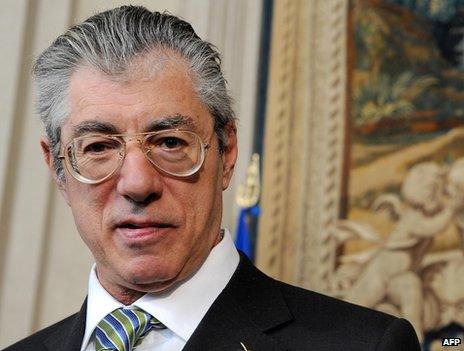Profile: Italy's Umberto Bossi
- Published

Umberto Bossi, the volatile former head of Italy's populist right-wing Northern League, was Silvio Berlusconi's key ally in three coalition governments since the 1990s, with the power to make or break his governments.
In fact, he brought down the first Berlusconi government in 1994, just months after the election.
The second coalition survived (2001-06) despite threats from Mr Bossi.
In November 2011, he urged Mr Berlusconi to resign shortly before he did so, paving the way for the technocratic cabinet of Mario Monti.
Mr Bossi may have set aside his original vision of independence for northern Italy, but his views on many other key issues have been just as controversial.
A serious stroke threatened to end his career in 2004, impairing his speech, but he made a gradual return to active politics, so much so thata profile in the Wall Street Journal last yearstill dubbed the 70-year-old an "Italian Fringe Firebrand".
However, in April 2012undefinedof the Northern League after the party became engulfed in a financial scandal.
Vital votes
Umberto Bossi has been many things: rock singer, salesman, laboratory technician.
He entered politics avowedly to uphold the interests of Italy's northern regions, fuelled by the perception that the rich north is burdened with subsidising the poorer south.
Starting out in the late 1980s, the native of Cassano Magnago, Lombardy, built up the Northern League from a one-senator party to the fourth-largest party in the country after the 1992 general election.
A popular party slogan at the time wasRoma ladrona(English: thieving Rome). There were calls to secede from Italy and build a new country called Padania.
The high point for Mr Bossi's party came in 1996, when it took more than 10% of the vote but its support fell sharply just a few years later, before a comeback in the 2008 election at more than 8%.
Its 60 votes in parliament were vital to the coalition led by Mr Berlusconi's Freedom Party.
Analysts say the success of the League was closely tied to Mr Bossi, whose populist rhetoric earned him notoriety on occasion.
'Fascist'
Some have sought to portray him as a martyr-in-waiting, mixing the peaceful disobedience of Gandhi with the fiery resistance of Braveheart.
He has variously railed at senior government figures, the left, immigrants, gay people and the EU.
In 2003, the then devolution ministerreportedly saidboats carrying illegal immigrants to Italy's shores should be shot out of the water.
On another occasion, he reportedly suggested a wall should be built along the entire Italian border with Slovenia to stem the flow of immigrants.
He has denounced the EU as the "Soviet Union of the West", and as a nest of "freemasons and communist bankers".
Mr Bossi was once described by Belgian Foreign Minister Louis Michel as a "fascist" - to which he shot back by calling Mr Michel a "red Nazi".
When the Wall Street Journal interviewed him in 2010, six years after his stroke, it found a man who slurred his words and had trouble walking and moving his left arm.
"Yet he keeps a hectic schedule, shuttling between the League's shabby Milan headquarters, government offices in Rome and the myriad villages in northern Italy where he holds feisty speeches on the weekends," the paper wrote.
Mr Bossi apparently had lost none of his power to shock, either. Asked about the scandals plaguing Mr Berlusconi, he said the prime minister could have sex with with whoever he liked "but he needs to be smarter about it, because people are out to get him".
His tolerance of the prime minister's handling of the economy may be another matter.